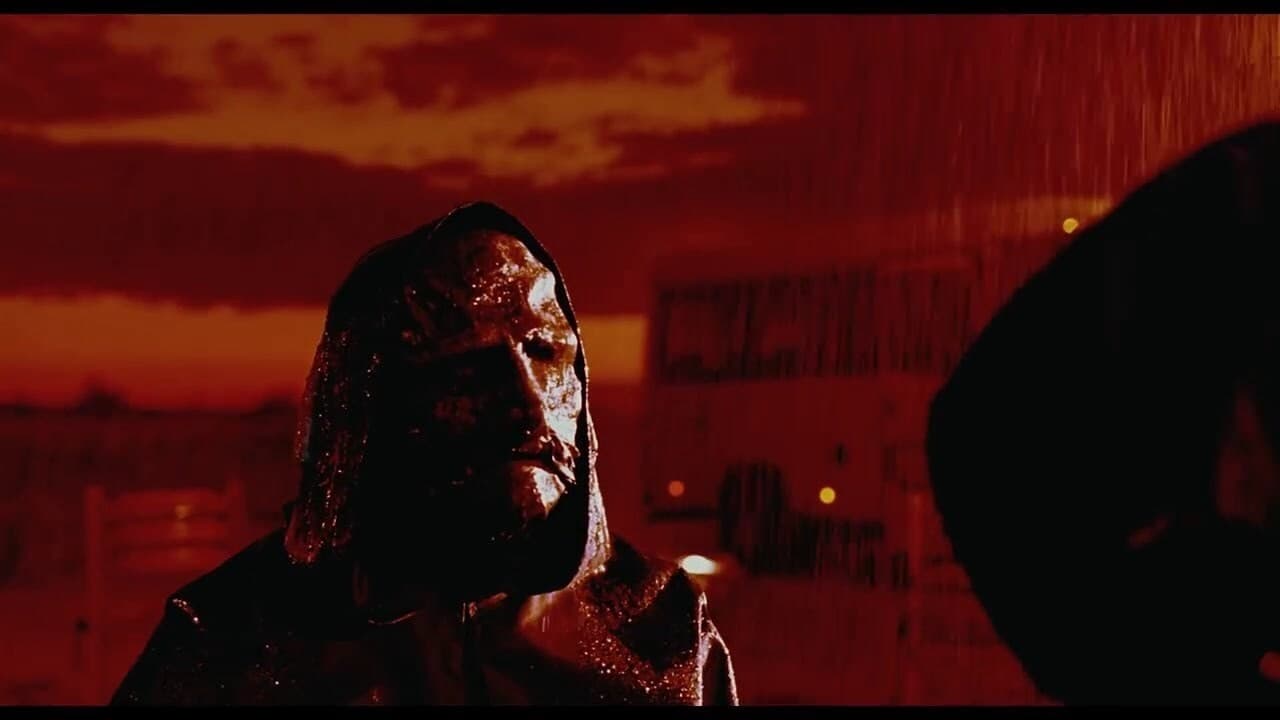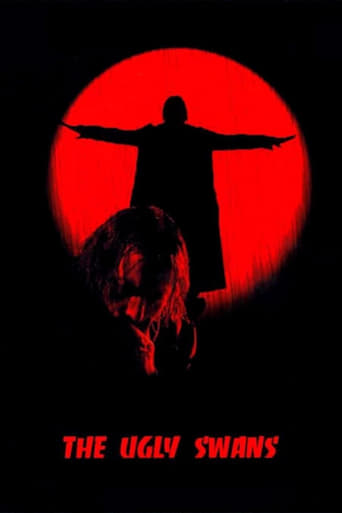

The Ugly Swans is the third film I have seen from director Konstantin Lopushansky, a protégé of Andrei Tarkovsky. The other two films, A Visitor to the Museum and Letters from a Dead Man, were both indebted to Tarkovsky's visual style. The Ugly Swans is less so. Furthermore, its story (based on a novel by the Strugatskiy brothers) is told in a more straight forward fashion, although not every point is spelled out for the viewer.Like A Visitor to the Museum, The Ugly Swans follows a man on a journey. In this case, the protagonist is an established fiction writer who is part of a U.N. team. The team's destination is Tashlinsk, a town that has been cut off from the rest of the world. Rain pours continually over the town and an unexplained infrared light coats the landscape with a red tint (shades of A Visitor to the Museum). Strange psychic creatures known as "wetters" control the area and mostly reside in a boarding school for gifted children. What are "Wetters"? What do they want? Why does the weather never change? These are the questions that the U.N. team have come to answer. The writer has a personal stake: His daughter is at the school.The Ugly Swans does not have the same hypnotic quality as Letters from a Dead Man or A Visitor to the Museum. Despite this the film features some great individual scenes: The crossing of a no-man's-land, a flooded restaurant open for business, and a powerful ending. Storywise, I was reminded of Children of the Damned in the way Lopushansky portrays the students at the school. The Russian film is more ambiguous than the British film and may be harder from some to enjoy. However, fans of cerebral science fiction films should be intrigued by The Ugly Swans, which is available on a Ruscico DVD.
... View MoreLong ago in Soviet Union lived two brothers -- Arkady and Boris Strugatsky. They had a dream -- to live in Communism -- and as they were writers, they devised the World of Noon, the future society of people appreciating creative work the most, socially responsible and enjoying living. It occurred, it wasn't a dream about Communism, that's why the writers soon became anti-Soviet, and the dream started living its separate life, changing, infecting new generations of engineers and scientists, strangely surviving under any system..."Ugly Swans" are not about World of Noon, but those who are able to appreciate it. So... The future intrudes into our world. Perhaps not a very happy one, because agents of it -- Aquatters -- are targeted by unknown genetic disease. Aquatters came to a provincial Russian town, set the rules they like and started to educate children. For children are our future, and changing them you make the world different. They teach rather strange things: what is hyperspace, and how to change weather, and other things, perhaps pretty important in the world of Aquatters. But top of all, they teach children to _think_.What's the problem, you would ask? A little one. In children's dreams there's no place for us. Our world is bankrupt, our values are corrupt, our moral is false. They are ruthless... but they only want to live in _their_ world. They go ahead, not looking on us and not caring. It's not surprising that our civilization considers them a menace. We also can be ruthless, and too often we are ruthless without necessity... Writer Viktor Banev who happens to visit the town faces uneasy moral choices. Taking sides. Remaining humane when bad things happen... not little for a single person? The movie is said to be based on the 1967 novel, but paradoxically, ideas spoken out in that moth-eaten year grew only more topical today. And the world too often can't propose growing youths nothing but dull job, race for money and dumb TV shows for entertainment. Who is more miserable, children grown by Aquatters, who can't, don't want to live in our world, or we who don't feel their longing for knowledge and agree with the role of well-trained monkeys? Humanism is also a new facet unveiled in the movie. Old... and new. Whatever the theories, there are living people beyond it... Writer Banev from the 1967 novel acts because he feels contempt for the old world; writer Banev in the movie acts because he feels pain of others... he cares about people, not about worlds, and that, I hope shows that the old world is yet alive.The last but not least, the movie isn't specifically Russian, more a tale of our civilization. And in, e.g. the United States it would be the same topical, I guess.
... View MoreAfter the storm of "Globalization" and quick growing of "multiplex"theaters with their overwhelming taste-unifying power, Konstantin Lopushansky remains to be one of the most consistent and humanistic author-filmmakers. His films have always dealt with serious problems threatening human civilization. Global climate change after nuclear war and ecological catastrophe("Lettes from a Dead man" and "Visitor of a Museum"),people's indifference to children's fate and utter powerlessness of contemporary intelligentsiya in the moment of social destruction("Russian Symphoy").Based on a novel of Strugatsky brothers, "Ugly Swans" shows a new step of Lopushansky's filmography. It is far more easy for ordinary film-goers for watching and understanding than previous works,because in "Ugly Swans" author's own intonation is deliberately concealed under the mask of "popular genre". Author's discourse here is near to that of rather anonymous storyteller, as that of Strugatsky brothers. The story is rather simple. It's of a tragic and desperate trial of Father-writer,representing the conscience of old generations and old civilization, to save his teenage daughter,who has passed through intellectual evolution with other teenagers and become superior,because they now are treated as a threat to the old human being and their civilization. Conservative people are trying to destroy the threat for human being. Children themselves don't want to return to the old world. They are living in some kind of supernatural ZONE,where they are taught by mutated adults called "Mokrytsy(wet people). Father can rescue children,including his own daughter,but outer world is found to be fatal for her in spiritual sense. Apparently, it's a allegory of contemporary cultural crisis embodied mainly by mass medias, which force new generations to stop their intellectual and spiritual development. As far as I know,previously Russian critics often blamed Lopushansky for his extreme seriousness and preachy approach to audience,but the situation seems to be changed after Lopuchansky's last work. And I heard that the Russian young audiences also saw it with sympathy in film-festivals and in Cinema Museum.Yes,after the global mode of excessive indulgence in "entertainment" and "blockbusters",at last the time has come for new generation to think their own fate reflected in "serious" films.
... View MoreUnfortenetly i didn't read the book(by Strugatsky brothers)but i seem to get the idea- the humanity is in a very critical point of time and as always there are 2 options... I must admit i'm not a big fan of this idea (it seems that every one think that only our generation lives in a very unique time and all the others are not so interesting)but the wonderful filming-the superb camera work just makes you to feel the darkness, wetness and the agony the people in the film are in.So in my point of view if you looking for grate camera work like in "Mother &Son", "Stalker" and so on you're in the right place, and also if you lived in USSR there some unforgettable moments that could have happen only there!
... View More